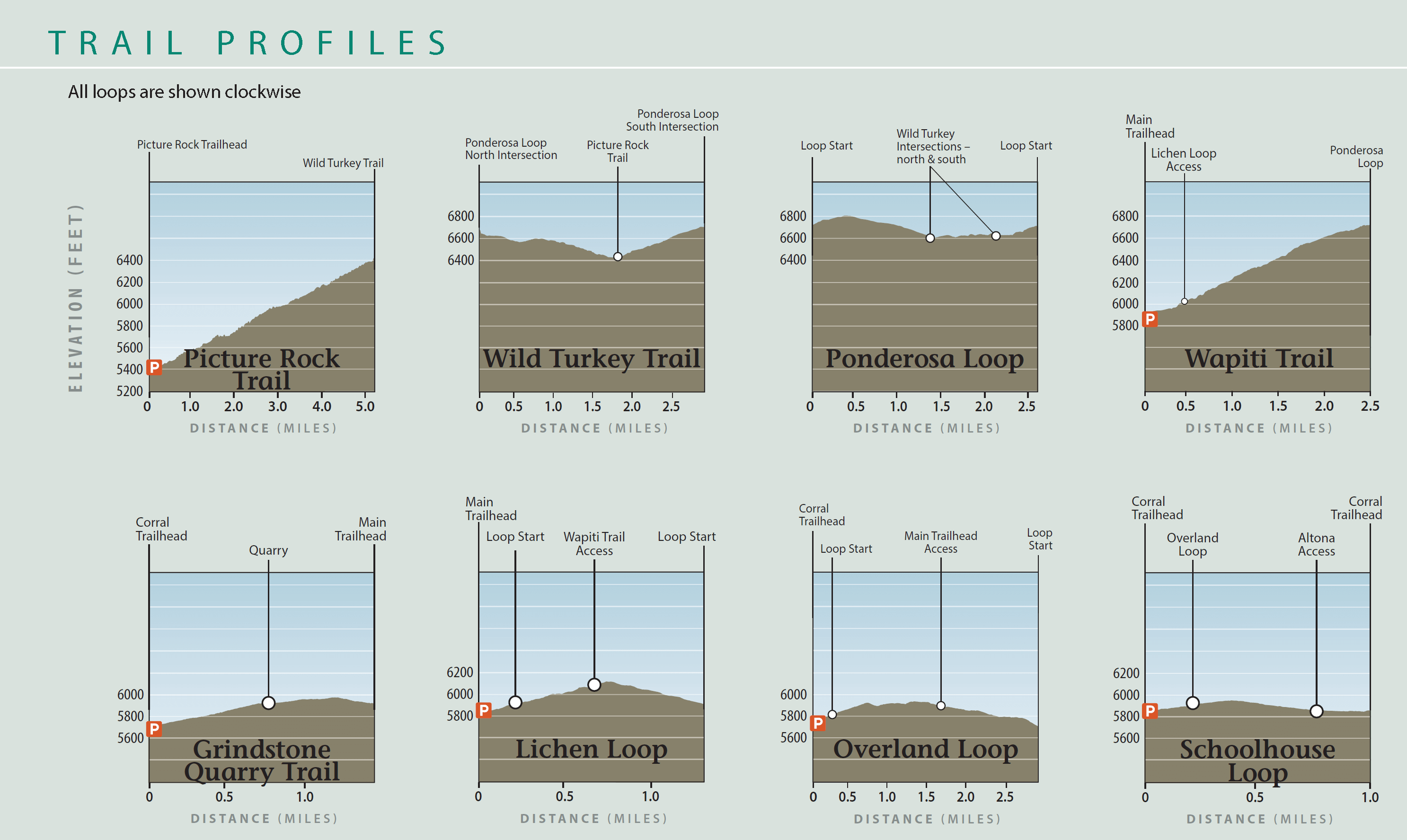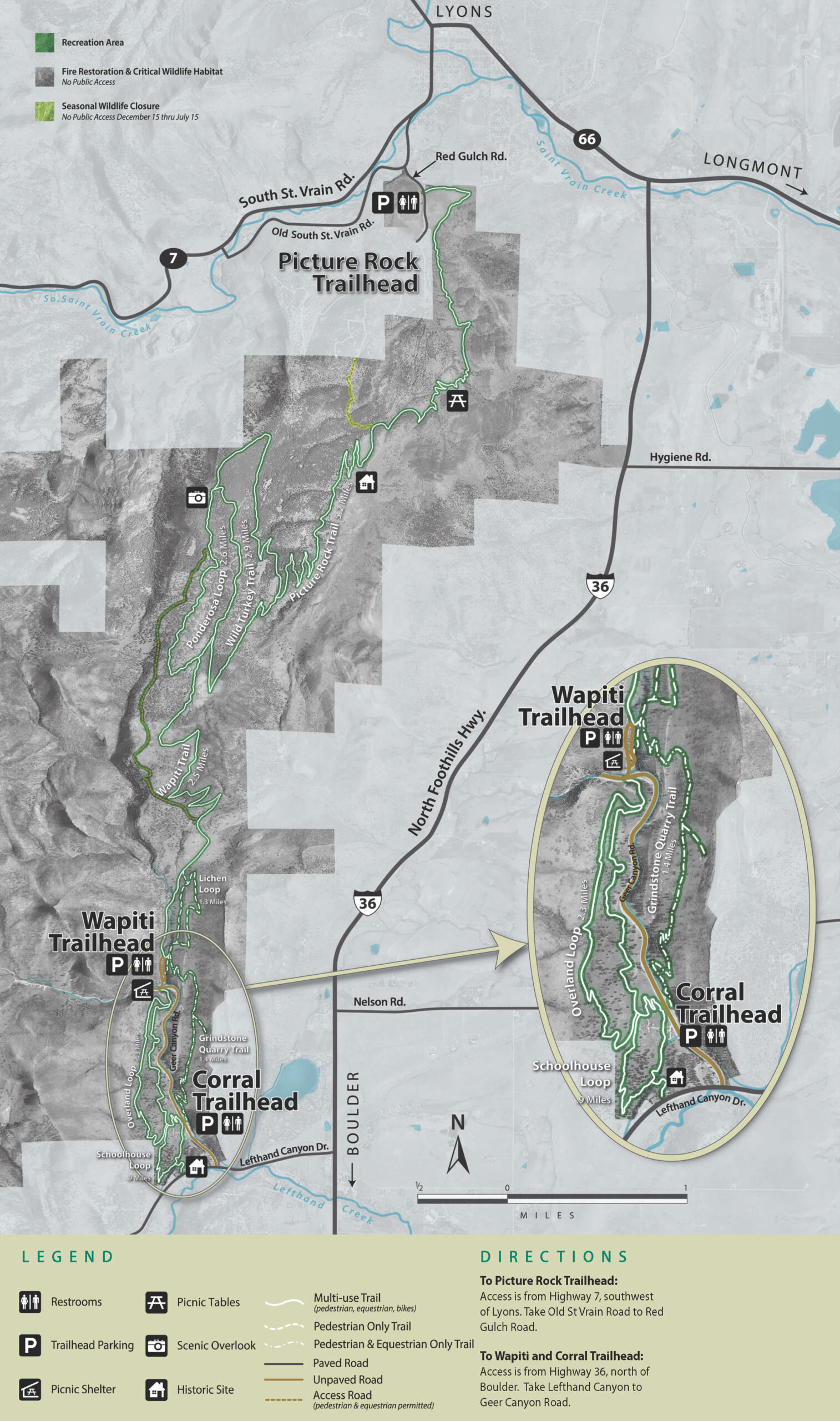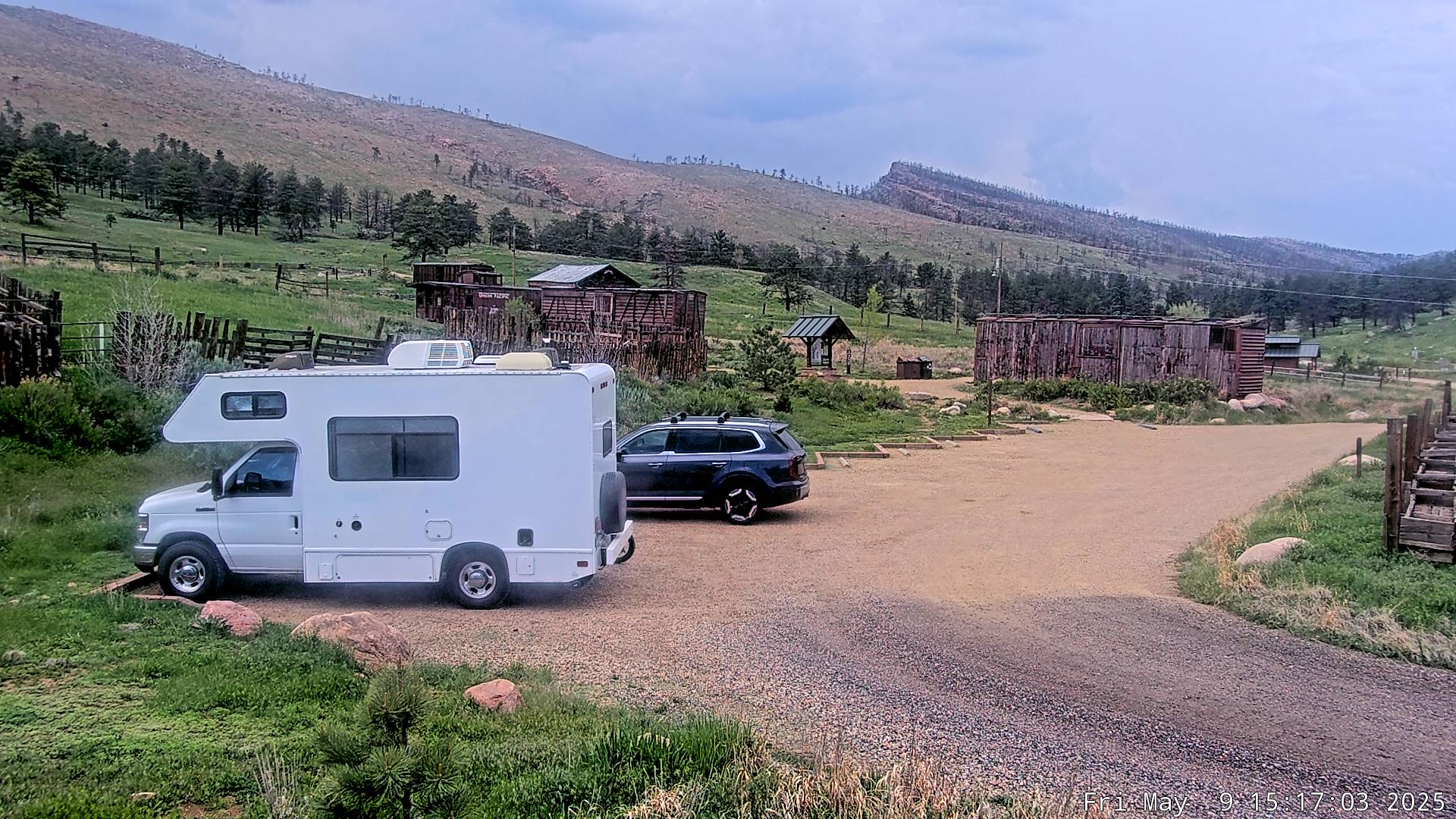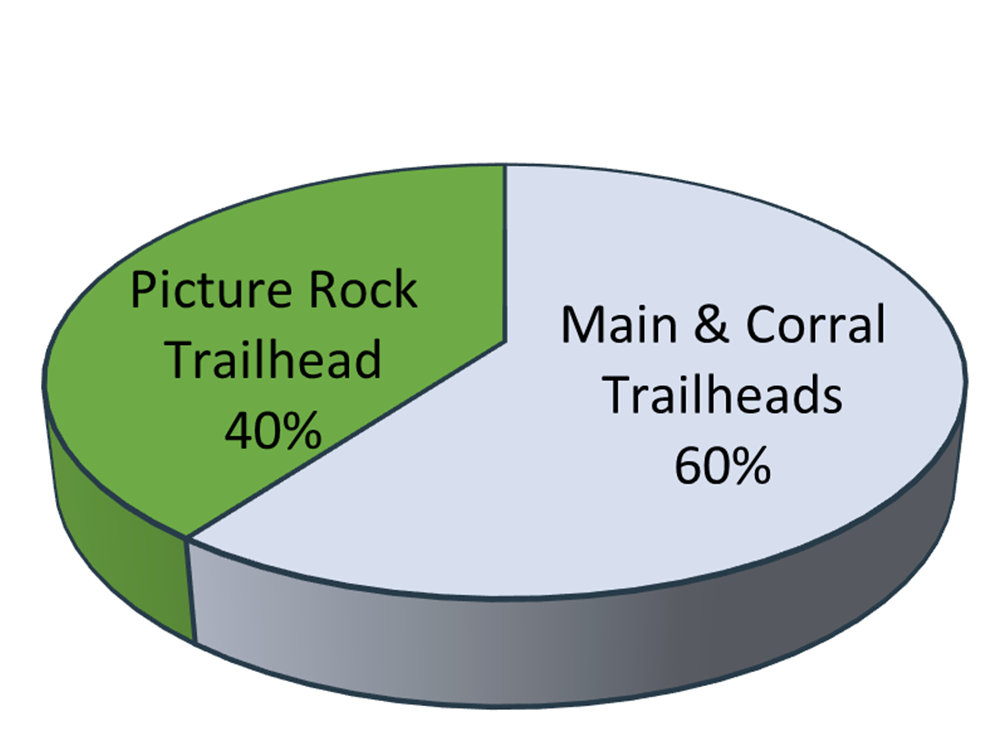With beautiful valleys, picturesque vistas, and forest meadows that seem to cling to the sky, Heil Valley Ranch offers a day’s adventure in the foothills.
Heil Valley Ranch
Trails
-
Grindstone Quarry Trail
1.4 miles – Easy





-
Lichen Loop
1.3 miles – Easy





-
Overland Loop
2.3 miles – Moderate
Bike Direction: Counterclockwise




-
Picture Rock Trail
5.2 miles – Moderate





-
Ponderosa Loop
2.6 miles – Moderate





-
Schoolhouse Loop
0.9 miles – Easy
Bike Direction: Counterclockwise




-
Wapiti Trail
2.5 miles – Moderate





The former detour on the access road remains open to pedestrians and equestrians only.
-
Wild Turkey Trail
2.9 miles – Moderate





Wapiti Trailhead
Note: The Wapiti Trailhead was previously referred to as the Main Trailhead.
Picture Rock Trailhead
Geer Canyon Rd. Overflow Parking
Rules & Regulations








Keep in Mind
- Dogs are not allowed due to wildlife concerns.
- Heil Valley Ranch is restricted to on-trail use only due to critical wildlife habitat and danger in the burn areas.
- The south side of the park was severely affected by the Cal-Wood Fire. Learn more about recovery efforts.
Photos
Open Gallery in New WindowThe Skills Loop and Schoolhouse Loop are great trails for beginning mountain bikers and can be accessed from the Corral Trailhead.
The short Skills Loop lets riders practice going over and around various obstacles that commonly encountered on the trails. The trail ends with a ride through a boxcar rail car.
The Schoolhouse Loop is an easy, 0.9 miles long trail that is perfect for entry-level mountain bikers.
Wapiti Trailhead Parking Lot Closures
During the summer monsoon season, the Wapiti Trailhead parking lot may be closed if weather reports indicate the potential for heavy rains, flash flooding, or debris flows. Due to the unpredictable nature of monsoonal storms, these closures may occur at any time. If the gate to the Wapiti Trailhead is closed, visitors should park elsewhere to access the trails and be aware of changing weather conditions, flood safety routes, and locations where they can climb to safety. Notice of closures will be posted as soon as possible.
Know Before You Go
- Check the weather forecast.
- Visit another park if rain is anticipated.
- Sign up for emergency alerts.
Be Prepared When at Heil Valley Ranch
- As you travel on trail, identify the flood safety routes.
- Keep your eyes on the sky! You may not be able to receive text messages, alerts, or hear sirens.
- Leave if storm clouds are building.
- Do not drive if you see flooding. Never drive through water if you cannot see the road beneath the water. The road may not be intact under floodwaters.
Emergency Alerts
Visitors are encouraged to sign up to receive reverse 911 emergency messages for potential flooding. Messages are generated by the Office of Emergency Management using Everbridge Alerts.
To add Heil Valley Ranch, use the following address:
1188 Geer Canyon Rd., Boulder CO 80302
Please note, messages can only be received if you have cellular service. The park has limited service depending on the exact area and service provider.
The 6,231 acres of Heil Valley Ranch are home to over 50 species of mammals representing 70 percent of all the mammals found in Boulder County. Nearly 100 types of birds call this area home. Golden eagles and prairie falcons nest in the cliffs and canyons. The variety of wildlife found here is partly due to the diversity of vegetation. Much of the land is covered by ponderosa pine forest. Among the ponderosa pines, a variety of shrubs, grasses, and wildflowers thrive providing coverage for small mammals and food for deer.
Mammals
- Abert’s squirrel
- Black bear
- Bobcat
- Chickaree
- Coyote
- Deer mouse
- Elk
- Little brown bat
- Meadow vole
- Mountain (Nuttall’s) cottontail
- Mountain lion
- Mule deer
- Red fox
- Rock squirrel
Birds
- American crow
- American kestrel
- American robin
- Black-billed magpie
- Broad-tailed hummingbird
- Brown-headed cowbird
- Canyon wren
- Chipping sparrow
- Cliff swallow
- Cordilleran flycatcher
- Common nighthawk
- Common raven
- Downy woodpecker
- Dusty grouse
- Golden eagle
- Great horned owl
- Hairy woodpecker
- House wren
- Lazuli bunting
- McGillivray’s warbler
- Mountain bluebird
- Mountain chickadee
- Northern flicker
- Prairie falcon
- Pygmy nuthatch
- Red-tailed hawk
- Rufous-sided (spotted) towhee
- Solitary vireo
- Scrub jay
- Steller’s jay
- Townsend’s solitaire
- Violet-green swallow
- Virginia’s warbler
- Western bluebird
- Western meadowlark
- Western wood-pewee
- Wild turkey
- White-breasted nuthatch
- Yellow-breasted chat
Amphibians & Reptiles
- Bullsnake
- Eastern fence lizard
- Plains garter snake
- Prairie rattlesnake
- Racer
- Western terrestrial garter snake
White Wildflowers
- Daisy fleabane (Erigeron sp)
- Easter daisy (Townsendia grandiflora)
- Mariposa lily (Calochortus gunnisonii)
- Miner’s candle (Cryptantha virgate)
- Mouse ear chickweed (Cerastium sp)
- Nodding onion (Allium cernuum)
- Plains larkspur (Delphinium carolinianum)
- Prickly poppy (Argemone polyanthemos)
- Pussytoes (Antennaria spp)
- Stemless evening primrose (Oenothera caespitosa)
- Wild onion (Allium textile)
- Yarrow (Achillea lanulosa)
Yellow Wildflowers
- Blanketflower (Gaillardia aristata)
- Cinquefoil (Drymocallis spp)
- Golden banner (Thermopsis divaricarpa)
- Gumweed (Grindelia squarrosa)
- Hairy false golden aster (Heterotheca villosa)
- Stonecrop (Amerosedum lanceolatum)
- Sulphur flower (Eriogonum umbellatum)
- Sunflower (Helianthus sp)
Pink & Red Wildflowers
- Ball cactus (Coryphantha vivipara)
- Showy milkweed (Asclepias speciosa)
- Wild geranium (Geranium caespitosum)
Green Wildflowers
- Fringed (silver) sage (Artemisia frigida)
- White (prairie) sage (Artemisia ludoviciana)
Purple & Blue Wildflowers
- Horsemint (Monarda fistulosa)
- Blue flax (Adenolinum spp.)
- Colorado loco (Oxytropis lambertii)
- Common harebell (Campanula rotundifolia)
- Fleabane (Erigeron sp)
- Gayfeather (Liatris punctuta)
- Larkspur (Delphinium nutallianum)
- Low Penstemon (Penstemon virens)
- One-sided penstemon (Penstemon secundiflorus)
- Pasqueflower (Pulsatilla ludoviciana)
- Silver lupine (Lupinus argenteus)
Shrubs & Cactus
- Common juniper
- Mountain maple
- Mountain mahogany
- Oregon grape
- Prickle-pear cactus
- Rabbitbrush
- Three-leaf sumac
- Yucca
Trees
- Douglas fir
- Ponderosa pine
- Rocky Mountain juniper
At Heil Valley Ranch you see the dramatic landscape where the Great Plains meet the Southern Rocky Mountains. The eastern-most ridge (hogback) at Heil Valley Ranch is capped by a rock layer called the Dakota Formation. On the west side of this property is another series of ridges that look red; this is the Lyons sandstone. This fine-grained sandstone, named after the town of Lyons, has been quarried locally and used for building throughout Boulder County.
From Mountainside To University
The Whitestone and Vickery Quarry Complex along the Picture Rock Trail operated from the 1890s to the 1960s. It was one of the more important quarry operations in the Lyons area. Lyons sandstone was mined there and can be seen in buildings on the University of Colorado campus.
Heil As Home
Four prehistoric sites (i.e. Native American sites used prior to contact with Anglo settlers) are on the property at Heil Valley Ranch. The first Anglo populations in the area were most likely beaver trappers exploring nearby rivers in the late eighteenth and early nineteenth centuries. One of the first Anglo females to reside in Boulder County was Nancy Phinox Geer, who settled here with her husband Solomon Geer in 1888.
Historic Buildings
You may spot a few old stone buildings used by ranch hands, as well as a silo in a meadow up the Picture Rock trail.
Acquisition
The majority of Heil Valley Ranch was purchased in 1993 and 1994 as part of the North Foothills Open Space that includes Hall Ranch and surrounding conservation easement properties.
Cal-Wood Fire
The Cal-Wood Fire started on Oct. 17, 2020, and raced downwind and downslope through Heil Valley Ranch. It consumed 5,000 acres in about five hours. In the end, it covered over 10,000 acres with more than half of that on Boulder County owned property (4,400 acres) and conservation easements (1,400 acres).









